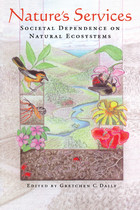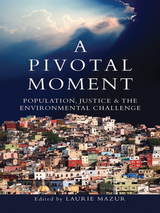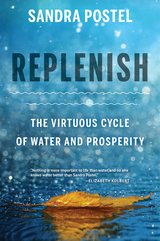
Life itself as well as the entire human economy depends on goods and services provided by earth's natural systems. The processes of cleansing, recycling, and renewal, along with goods such as seafood, forage, and timber, are worth many trillions of dollars annually, and nothing could live without them. Yet growing human impacts on the environment are profoundly disrupting the functioning of natural systems and imperiling the delivery of these services.
Nature's Services brings together world-renowned scientists from a variety of disciplines to examine the character and value of ecosystem services, the damage that has been done to them, and the consequent implications for human society. Contributors including Paul R. Ehrlich, Donald Kennedy, Pamela A. Matson, Robert Costanza, Gary Paul Nabhan, Jane Lubchenco, Sandra Postel, and Norman Myers present a detailed synthesis of our current understanding of a suite of ecosystem services and a preliminary assessment of their economic value. Chapters consider:
- major services including climate regulation, soil fertility, pollination, and pest control
- philosophical and economic issues of valuation
- case studies of specific ecosystems and services
- implication of recent findings and steps that must be taken to address the most pressing concerns


"Remarkable." —New York Times Book Review
"Clear-eyed treatise...Postel makes her case eloquently." —Booklist, starred review
"An informative, purposeful argument." —Kirkus
We have disrupted the natural water cycle for centuries in an effort to control water for our own prosperity. Yet every year, recovery from droughts and floods costs billions of dollars, and we spend billions more on dams, diversions, levees, and other feats of engineering. These massive projects not only are risky financially and environmentally, they often threaten social and political stability. What if the answer was not further control of the water cycle, but repair and replenishment?
Sandra Postel takes readers around the world to explore water projects that work with, rather than against, nature’s rhythms. In New Mexico, forest rehabilitation is safeguarding drinking water; along the Mississippi River, farmers are planting cover crops to reduce polluted runoff; and in China, “sponge cities” are capturing rainwater to curb urban flooding.
Efforts like these will be essential as climate change disrupts both weather patterns and the models on which we base our infrastructure. We will be forced to adapt. The question is whether we will continue to fight the water cycle or recognize our place in it and take advantage of the inherent services nature offers. Water, Postel writes, is a gift, the source of life itself. How will we use this greatest of gifts?

The conventional approach to river protection has focused on water quality and maintaining some "minimum" flow that was thought necessary to ensure the viability of a river. In recent years, however, scientific research has underscored the idea that the ecological health of a river system depends not on a minimum amount of water at any one time but on the naturally variable quantity and timing of flows throughout the year.
In Rivers for Life, leading water experts Sandra Postel and Brian Richter explain why restoring and preserving more natural river flows are key to sustaining freshwater biodiversity and healthy river systems, and describe innovative policies, scientific approaches, and management reforms for achieving those goals. Sandra Postel and Brian Richter: explain the value of healthy rivers to human and ecosystem health; describe the ecological processes that support river ecosystems and how they have been disrupted by dams, diversions, and other alterations; consider the scientific basis for determining how much water a river needs; examine new management paradigms focused on restoring flow patterns and sustaining ecological health; assess the policy options available for managing rivers and other freshwater systems; explore building blocks for better river governance.
Sandra Postel and Brian Richter offer case studies of river management from the United States (the San Pedro, Green, and Missouri), Australia (the Brisbane), and South Africa (the Sabie), along with numerous examples of new and innovative policy approaches that are being implemented in those and other countries.
Rivers for Life presents a global perspective on the challenges of managing water for people and nature, with a concise yet comprehensive overview of the relevant science, policy, and management issues. It presents exciting and inspirational information for anyone concerned with water policy, planning and management, river conservation, freshwater biodiversity, or related topics.
READERS
Browse our collection.
PUBLISHERS
See BiblioVault's publisher services.
STUDENT SERVICES
Files for college accessibility offices.
UChicago Accessibility Resources
home | accessibility | search | about | contact us
BiblioVault ® 2001 - 2024
The University of Chicago Press









